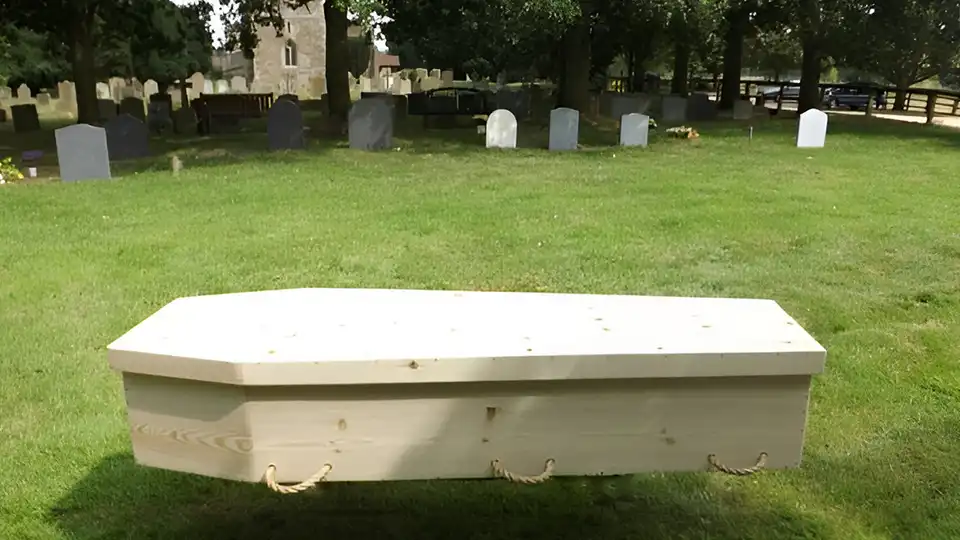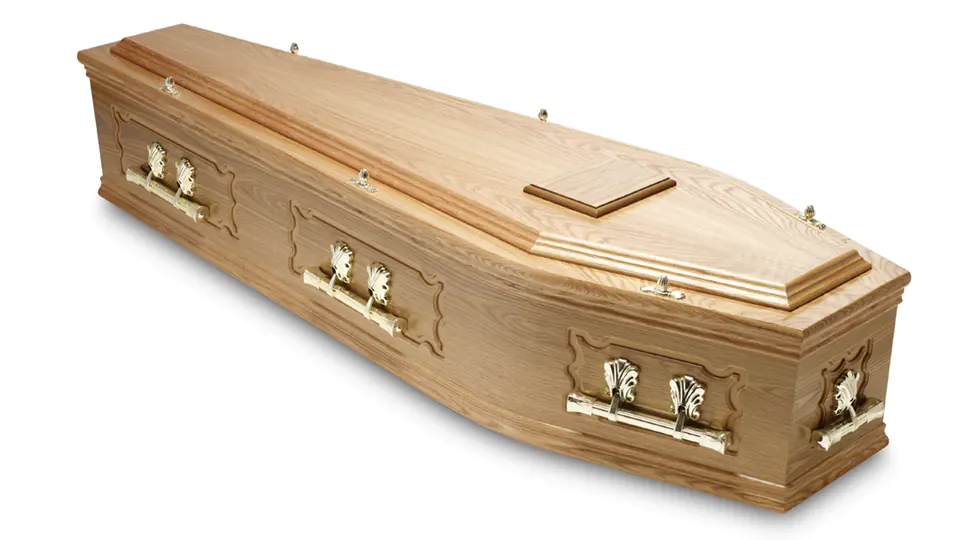Coffin Prices and Different Types
When it comes to planning a funeral, one of the significant costs can be the coffin. Coffin prices can vary widely depending on the type of coffin choosen. Many different types of coffin and links to their costs are listed to help you find the type of coffin and the cheapest coffin prices. Discover everything you need to know about the coffins listed, including materials used to manufacture and environmental impact.
Table of contents
What is a low price coffin?
- A cardboard coffin is generally the cheapest
- Wicker (Willow, Bamboo, Cane, etc.) are generally the second cheapest
- Chipboard coffins are normally the third cheapest
- A plain pine handmade pine coffin is normally the fourth cheapest
- Handmade oak coffins are normally the fifth cheapest
You can buy coffins from suppliers who deliver throughout the UK which are shown below. However, in some cases you will only be able to buy through an undertaker. For up-to-date prices on a chosen coffin visit the links below:
- Willow English hand-made £700+
- Willow English hand-made £650+
- Timber English hand-made £610+
- Chipboard veenered wood grain £445+
- Cardboard £150+
- Banana leaves £340+ not supplied to the public – purchase from funeral director.
- Pandanus leaves £562.98+
- Cane £330+ not supplied to the public – purchase from funeral director.
- Seagrass P.O.A not supplied to the public – purchase from funeral director.
- Bamboo £368.66+
- Wool English hand-made P.O.A not supplied to the public – ask your funeral director to purchase through JC Atkinson Tel: 0191 415 1516.
P.O.A = “Price on application” You are advised to shop around different funeral directors to compare prices.
Types of coffins
There are many different types of coffins available, including, cardboard and chipboard. eco-friendly options made from natural timber, bamboo, banana leaves, cane, pandanus leaves, seagrass, willow, and wool. Each type of coffin has its own unique features and benefits to the person purchasing it.
Natural timber coffins
Benefits:
- Environmentally friendly
- Classic traditional wood look
- Handbuilt

Image copyright and courtesy of Feet First Coffins
Environmentally friendly timber coffins are perhaps the most traditional of coffins. However, it’s important to check that the timber is sourced from sustainable sources. It is important not to contribute to deforestation or a loss of natural habitat.
Most natural timber coffins are joined together with wooden dowels not metal screws or nails. This is so that there are non-biodegradable items in the coffin. Handles are normally natural degradable rope. These handmade coffins are not the lowest coffin prices due to the lengthy labour in making them.
Cardboard coffins
Benefits:
- Eco benefits: Use 60% less energy to cremate than wood and emit up to 90% fewer emissions
- Affordability: One of the cheapest coffin options available
- Sustainability: Made from recycled materials and fully biodegradable (if unlined)
- Customisation: Families often paint or decorate cardboard coffins.
Environmental impact:
Normally degrades quickly however, it can take a long time to decay and chemicals soaking into soil (for a burial) if the coffin is treated with a waterproof lining.

Cardboard coffins are made from recycled cardboard and are designed to be biodegradable, making them a popular choice for people who are looking for a sustainable and affordable option for their loved one’s final resting place.
One of the main benefits of cardboard coffins is their affordability. They are typically much less expensive than traditional coffins made from wood, metal, or other materials. This can be a particularly important consideration for people who are on a budget or who want to keep coffin prices as low as possible.
Another benefit of cardboard coffins is their sustainability. Because they are made from recycled materials, they have a low environmental impact. They are also designed to biodegrade quickly and safely, without releasing harmful chemicals or gases into the environment (unless coated inside with a waterproof liner).
Painting a cardboard coffin
Cardboard coffins are also customisable, with many companies offering the option to personalise the coffin with artwork, photographs, or messages. This can make them a meaningful and personal choice for those who are looking for a way to honour their loved one’s memory.
If you were planning to decorate the coffin, its best to use water-based paints, such as emulsion, powder paint or acrylics. These personal touches can make the service feel more uplifting and less sombre. Cardboard coffins are normally a plain brown or white finish.
To paint and personalise a coffin, you could have the coffin delivered to your home and later collected by the undertaker. If the undertaker cannot collect, there is a UK van delivery service listed under Van transport service.
Chipboard coffins
Benefits:
- Affordable and widely used
- Can be personalised with painted or printed designs
Environmental impact:
Not environmentally friendly, studies have shown that chipboard’s resins and coatings can release formaldehyde, heavy metals, and other toxins into the soil for decades. Research at Zandfontein Cemetery found larger levels of lead, zinc, copper, and arsenic in soil near graves linked to coffin materials. The Green Burial Council has warned that such chemicals can last in soil for up to 100 years.

Around 80% of coffins used are chipboard construction. They are the most popular choice due to their affordability and ease of manufacture. They will in time completely decay provided no plastic or metal handles are fitted.
These more affordable coffins are made from recycled wood chips that are compressed and bonded together with a resin adhesive to create a strong and durable material. The surface is then usually covered in a thin plastic veneer to imitate a wood grain look.
One of the main benefits of chipboard coffins is their affordability. They are typically much less expensive than traditional coffins made from wood, wicker, metal, or other expensive materials, making them one of the lower coffin prices.
Chipboard coffins are also customisable, with many companies offering the option to personalise the coffin with artwork, photographs, or messages. This can make them a meaningful and personal choice for those who are looking for a way to honour their loved one’s memory.
In addition, chipboard coffins are often designed to look similar to traditional coffins, so they can be a good option for people who want a more traditional appearance without the high cost.
Wicker coffins
Benefits:
- Environmentally friendly
- Natural appearance
- Handmade

Wicker coffins, also known as willow coffins, are an eco-friendly and sustainable option for funerals. These coffins are made from renewable and quickly biodegradable woven willow or other natural materials, making them a popular choice for people who want to honour the deceased in a way that is environmentally friendly and naturally attractive. They decay without releasing harmful chemicals or gases into the environment.
Another benefit of wicker coffins is their natural appearance. They are often handcrafted and can be customised with personal touches, such as flowers or ribbons. This can make them a meaningful and personal choice.
Wicker coffins are also a lightweight option, which can make them easier to transport and handle during the funeral service. They are also typically less expensive than traditional coffins made from wood, metal, or other materials, making them a good option for those on a budget comparing coffin prices.
In addition, wicker coffins are available in a variety of sizes, making them suitable for people of all ages and sizes.
Eco coffins
Eco-friendly coffins is the name given to biodegradable coffins which have a reduced environmental impact and are a growing trend in the UK as people become increasingly concerned about the impact of traditional burial practices on the environment. These coffins are made from sustainable materials such as those listed above apart from chipboard. They are designed to biodegrade quickly and naturally. Cardboard coffins without the waterproof liner are also classed as eco-friendly coffins.
Eco-friendly coffins are also often seen as a more personal and meaningful choice. Traditional coffins to some can feel impersonal and sterile, but eco-friendly coffins such as those made from natural materials look more rustic, which can be more fitting for someone who had a strong connection to nature.
Lead-lined coffins
Some traditional solid wood coffins can be lead lined, although this is not normally required unless transporting a body overseas. However, the use of lead-lined coffins is becoming less common due to environmental concerns. Lead is a toxic substance and can poison the soil, potentially contaminating groundwater and other natural resources. As a result, many countries have implemented regulations to limit the use of lead in coffins, or have banned it altogether.
Coffins for cremation
Cardboard coffins are becoming increasingly popular due to their eco-friendly nature. They take around 60% less energy to burn compared to wood, and emit up to 90% fewer emissions.
If you’re purchasing a coffin for cremation, it is crucial to ensure with the manufacturer that it is FFMA (Funeral Furnishing Manufacturers’ Association) approved. This means that it is a suitable coffin for cremation as it conforms to regulations.
Coffins with an FFMA certificate are also recommended for burial, as they are lined and have a board in the base to give the coffin strength. This is especially important for wicker and cardboard coffins.
Coffins for natural burial sites
Natural burial grounds often have strict coffin material rules, no embalming, and no waterproof liners or plastic / metal fittings. Fot this reason cardboard coffins may not be accepted at a natural burial site if it has a waterproofing lining.
It is crucial to inquire about the type of coffin allowed before making a purchase for a natural burial.
FAQ’s
What is the cheapest coffin you can buy in the UK?
Cardboard coffins are the most affordable, from around £150 when purchased directly from suppliers.
Are chipboard coffins bad for the environment?
Yes, most contain synthetic resins and veneers that can release toxins into the soil for decades.
Which coffins are accepted at natural burial sites?
Usually only biodegradable coffins without plastic / metal fittings or chemical linings are accepted.
Can I buy a coffin without using a funeral director?
Yes, many suppliers (not all) sell directly to the public with UK-wide delivery.
Summary
It’s important to keep in mind the different materials available, regulations to follow, and eco-friendly options. Comparing coffin prices and the right coffin can make a significant difference in the cost of a funeral, as well as its impact on the environment. For more on eco-friendly coffins visit Environmentally friendly coffins.
Step 1: Low-Cost Funerals
Step 2: Funeral Service
Step 3: Coffin Prices
Step 4: Funeral Wake Ideas
Step 5: Home & Natural Burial
For further helpful information covering different aspects of funerals from poems, flowers, bereavement gift ideas, what to wear at a funeral, low-cost headstones and much more, visit the Save Funeral Costs™ blog.

